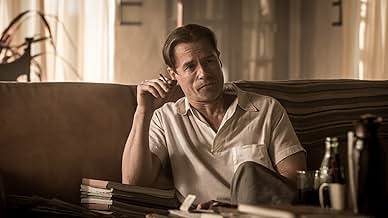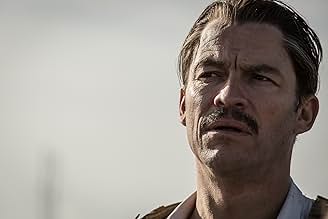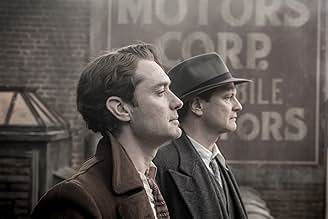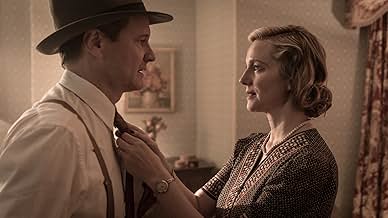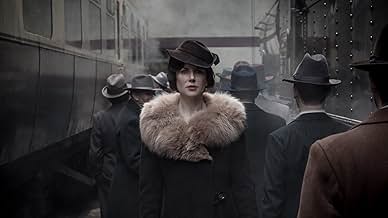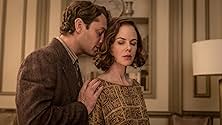Eine Chronik über Max Perkins' Zeit als Lektor bei Scribner, wo er unter anderen Thomas Wolfe, Ernest Hemingway und F. Scott Fitzgerald betreute.Eine Chronik über Max Perkins' Zeit als Lektor bei Scribner, wo er unter anderen Thomas Wolfe, Ernest Hemingway und F. Scott Fitzgerald betreute.Eine Chronik über Max Perkins' Zeit als Lektor bei Scribner, wo er unter anderen Thomas Wolfe, Ernest Hemingway und F. Scott Fitzgerald betreute.
- Auszeichnungen
- 1 Gewinn & 6 Nominierungen insgesamt
Angela Sant'Albano
- Bertha Perkins
- (as Angela Ashton)
Ray Strasser King
- James, Mailroom Clerk
- (as Ray Strasser-King)
Empfohlene Bewertungen
GENIUS is the name attached to John Logan's screen lay adaptation of A. Scott Berg's 1979 novel 'Max Perkins: Editor of Genius' and Michael Granage directs a superlative cast in this recreation of the Depression of the 1930s America. Despite the fact that the film focuses on the raucous life of Thomas Wolfe, the true remarkable character throughout is Max Perkins – the editor at Scribner's in New York City who is responsible for the editing of the books of not only Wolfe but also of Ernest Hemingway and F. Scott Fitzgerald.
The film plays the period well opening in 1929 when writer Thomas Wolfe (Jude Law), decided to keep the appointment made by Max Perkins (Colin Firth), editor at Scribner's, he had no illusions: his manuscript would be turned down as had invariably been the case. But, to his amazement, his lengthy autobiographical novel 'O Lost', which was to become "Look Homeward, Angel" was accepted for publication. The only trouble was that it was overlong (5,000 pages) and had to be reduced. Although reluctant to see his poetic prose trimmed, Wolfe agreed and helped by Perkins, who had become a true friend, managed to cut 90,000 words from the book, with the result that it instantly became a favorite with the critics and bestseller. Success was even greater in 1935 when "Of Time end the River" appeared but Wolfe's inability to cope with the editing process got in the way of his relationship with his mistress (Nicole Kidman) and with Max, and Wolfe died in 1938 after writing 'You Can't Go Home Again', 'The Web and the Rock' and some short stories. Wolfe remained faithful to his appreciation for Max Perkins and died from tuberculosis of the brain a lonely man at age 38.
The supporting cast is superb – Laura Linney as Louis Perkins, Guy Pearce as F. Scott Fitzgerald, Dominic West as Ernest Hemingway – and both Law and Firth carry the story well, maintaining a credible relationship in all its stages. Unfortunately the ending of the film is gushingly saccharine – not at all a good choice. But the movie is a tasty bit of acting and history and deserves to be seen.
The film plays the period well opening in 1929 when writer Thomas Wolfe (Jude Law), decided to keep the appointment made by Max Perkins (Colin Firth), editor at Scribner's, he had no illusions: his manuscript would be turned down as had invariably been the case. But, to his amazement, his lengthy autobiographical novel 'O Lost', which was to become "Look Homeward, Angel" was accepted for publication. The only trouble was that it was overlong (5,000 pages) and had to be reduced. Although reluctant to see his poetic prose trimmed, Wolfe agreed and helped by Perkins, who had become a true friend, managed to cut 90,000 words from the book, with the result that it instantly became a favorite with the critics and bestseller. Success was even greater in 1935 when "Of Time end the River" appeared but Wolfe's inability to cope with the editing process got in the way of his relationship with his mistress (Nicole Kidman) and with Max, and Wolfe died in 1938 after writing 'You Can't Go Home Again', 'The Web and the Rock' and some short stories. Wolfe remained faithful to his appreciation for Max Perkins and died from tuberculosis of the brain a lonely man at age 38.
The supporting cast is superb – Laura Linney as Louis Perkins, Guy Pearce as F. Scott Fitzgerald, Dominic West as Ernest Hemingway – and both Law and Firth carry the story well, maintaining a credible relationship in all its stages. Unfortunately the ending of the film is gushingly saccharine – not at all a good choice. But the movie is a tasty bit of acting and history and deserves to be seen.
I did get caught up in this story. I have admired the work of Thomas Wolfe as well as the accomplishments of F. Scott Fitzgerald and Ernest Hemingway. This film makes Wolfe about as quirky and outrageous as one can be. He reminds me a little of Sheldon Cooper on "The Big Bang Theory," totally self-absorbed and uninterested in the lives and aspirations of others. Apparently, there were numerous inaccuracies in this film as they relate to the publication of the first book, "Look Homeward, Angel," as well as biographical events involving his lover. Obviously, there is always license in these films, but how important are these criticisms? The acting of Colin Firth, Nicole Kidman, and Jude Law make this cook. A view into the lives of the most successful authors of their time and the master editor at Scribner's is beautifully done. There is fantastic cinematography. Even if every fact fails under scrutiny, it gives a portrayal of a fascinating man and his cohort. I recommend it.
I find it hard to understand how this excellent film is getting negative reviews from critics. It is like a breath of fresh air for thinking movie goers. It is a thoughtful, intelligent and highly entertaining look at Maxwell Perkins, an editor who as he said wanted to bring "good books" to the public. He did, bringing us the works of Fitzgerald, Hemingway and Thomas Wolfe who is the focus of the film. It gives a historical perspective of two opposites (Perkins and Wolfe) who working together create something substantial. Perkins is a strong main character with a noble moral center, beautifully underplayed by Firth. When did we last see someone acting nobly in a film? In contrast, to the larger than life and decadent Wolfe (I had no idea Wolfe was played by Jude Law, until after the film) Law immerses himself in the character. The fact that this is a true story makes it all the more compelling. My fifteen year old daughter who is well versed in the writings of both Fitzgerald and Hemingway encouraged me to see Genius. We both walked away exhilarated; the way you feel after seeing a really good movie that transported you somewhere else. The Director, writer, actors and composer/ scorer all did a first rate job to help bring a to bring a great film to the public.
Colin Firth and Jude Law Portray editor Max Perkins and his newest client, Tomas Wolfe. Perkins is a tight wound package of seriousness, work being his life. Wolfe is a frenetic writer, eating up everything around him with voracity. The polar opposites take on Wolfe's first novel, "Look Homeward, Angel." I admit, Law's Wolfe is energizer- bunny out-of-control frenetic at times, but it's that kind of mind that gave us one of the greatest (if not the greatest) American novels of all time. Having read "Angel," I completely bought into it. The relationship between editor and writer becomes extremely close, at times casting aside the women in their lives. Laura Linney is Louise Perkins, devoted wife to Max and their 5 daughters. She is also trying to keep her own writing career alive, with little help from her work obsessed husband. Nicole Kidman is Aline Bernstein, a married woman currently shacking up with Wolfe. She was his inspiration in writing "Angel" and is over zealously jealous of Tom's relationship with Max. Like, seriously, wack-job crazy. This role was the weak link for me, didn't like her from her second appearance on screen. The movie moves through their lives, another published book, and on to Wolfe's untimely death. (I am pretty sure that isn't a spoiler.) I don't want to go in to the plot anymore, except to say that I agree with another reviewer about the scene in the jazz club. A really great way to show how minds, and the streaming of thought, can be so different between people.
The cinematography is beautiful, sepia tones bring you back to the years right before and during the depression. Extravagance and soup kitchens, back-to-back. The music bangs out with Wolfe's bombastic behavior, and mellows with Max.
This movie is a movie about writers and readers, for what editor isn't a closet writer? It's also for the same audience, with several nods to a few other greats of that period; Hemingway and F. Scott Fitzgerald, but mostly, to Wolfe. When Max is reading "Angel" through for the first time, his daughter walks in. She looks at the page and says, "Wow, that's a really long paragraph" and Max answers "It started four pages ago..." THAT is Wolfe. That book was the most difficult book I have ever read. This movie is also about, who exactly is the genius? Wolfe is, obviously. But does that make Max, who edited, made these books marketable, and made Wolfe a celebrity of his day, any less of a genius? That is left for the viewer.
The cinematography is beautiful, sepia tones bring you back to the years right before and during the depression. Extravagance and soup kitchens, back-to-back. The music bangs out with Wolfe's bombastic behavior, and mellows with Max.
This movie is a movie about writers and readers, for what editor isn't a closet writer? It's also for the same audience, with several nods to a few other greats of that period; Hemingway and F. Scott Fitzgerald, but mostly, to Wolfe. When Max is reading "Angel" through for the first time, his daughter walks in. She looks at the page and says, "Wow, that's a really long paragraph" and Max answers "It started four pages ago..." THAT is Wolfe. That book was the most difficult book I have ever read. This movie is also about, who exactly is the genius? Wolfe is, obviously. But does that make Max, who edited, made these books marketable, and made Wolfe a celebrity of his day, any less of a genius? That is left for the viewer.
It's a movie about Thomas Wolfe and Max Perkins, with four great actors: Colin Firth as Perkins, sporting a New England accent with overtones of having studied in England; Jude Law as Wolfe, sporting a generic Southern accent; Laura Linney as Mrs. Perkins and the always welcome Nicole Kidman as Wolfe's mistress. It's acting pyrotechnics time and extremely satisfying.
Wusstest du schon
- WissenswertesA. Scott Berg's biography "Max Perkins: Editor of Genius", on which the film is based, won the National Book Award in 1978.
- PatzerMaxwell Perkins tells Thomas Wolfe his book needs a new title that will appeal to potential purchasers, and gives the example of F. Scott Fitzgerald changing the title of a novel from "Trimalchio in West Egg" to "The Great Gatsby." The real Perkins, as Fitzgerald's editor, certainly would have known that "The Great Gatsby" was a flop upon its release in 1925 and did not sell well until the 1950s.
- Zitate
Aline Bernstein: I don't exist anymore. I've been edited.
- Crazy CreditsThe title "Genius" appears on the screen 9 minutes into the movie.
- SoundtracksFlow Gently Sweet Afton
(Sottish traditional)
Composed by Jonathan E. Spillman
(1873)
Performed by London Voices
Top-Auswahl
Melde dich zum Bewerten an und greife auf die Watchlist für personalisierte Empfehlungen zu.
- How long is Genius?Powered by Alexa
Details
- Erscheinungsdatum
- Herkunftsländer
- Offizielle Standorte
- Sprachen
- Auch bekannt als
- Pasión por las letras
- Drehorte
- Produktionsfirmen
- Weitere beteiligte Unternehmen bei IMDbPro anzeigen
Box Office
- Bruttoertrag in den USA und Kanada
- 1.361.045 $
- Eröffnungswochenende in den USA und in Kanada
- 98.274 $
- 12. Juni 2016
- Weltweiter Bruttoertrag
- 7.435.006 $
- Laufzeit1 Stunde 44 Minuten
- Farbe
- Sound-Mix
- Seitenverhältnis
- 2.35 : 1
Zu dieser Seite beitragen
Bearbeitung vorschlagen oder fehlenden Inhalt hinzufügen







